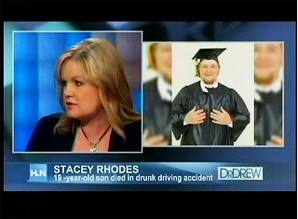'Social Hosting' is personal for LCB employee and MADD volunteer

On June 14, 2008, Rhodes’ 19-year-old son Ryan died in a car crash in Arizona where he was going to college. His best friend, who was driving the car, had been served alcohol earlier in the night by another friend’s mother, and had a Blood Alcohol Content twice the legal limit. Social hosting refers to hosting a gathering where underage drinking occurs.
“You look for moments where you feel better,” she said in a recent interview about her TV appearance. “It does happen. Not only did my son die that day, the person I was died with him. I realize how fragile life is and there is no guarantee of a tomorrow.”
Rhodes, who serves as a spokeswoman for MADD, appeared on the May 9 show, along with the national president of MADD, a drug counselor, and a mom and her son, to discuss parents who let their teens drink at home.
The topic has been in the news recently after “The Journal of Studies on Alcohol and Drugs” published a study that found that teens that drink with adult supervision are more likely to develop problems with alcohol.
Social hosting segment
A mom and her son were the first guests. The mom, who was raised in England and Greece, allows her 11 and 14-year-old sons to drink alcohol at home. The mom told Dr. Drew and the drug counselor that this practice is common in Europe, and believes by introducing it early, it removes some of the mystique surrounding alcohol.
Rhodes, who was the next guest, shared Ryan’s story, and said parents should talk to teens regularly about their choices and the potential consequences. Perhaps the most memorable moment of the show came when Dr. Drew asked Rhodes if she wanted to say anything to the mother who allows her son to drink.
“I have a really powerful picture that I sent into Dr. Drew, and it`s of my 15-year-old, Ryan`s younger brother, who was scattering Ryan`s ashes, and he`s just in a cloud of ashes,” Rhodes told the mother. “I don`t want that to happen to you. And your son is gorgeous, and what a lovely smile. And, you know, we celebrated Mother`s Day yesterday, and I didn`t get that from Ryan. So I think, again you`re going to parent the way you`re going to parent. But for the majority of parents out there that allow their kids to drink, what are you teaching them? What are you teaching them?”
Laura Dean-Mooney, the MADD National President, shared the statistic that parents are the No. 1 influence on whether teens drink. She shared some of the consequences of underage drinking, such as flunking out of school, being sexually assaulted and becoming alcohol-dependent later in life.
“And sure, kids may make bad decisions,” Dean-Mooney said. “But we need to encourage them to make the right decision, and we need to have the conversation with them long before they get to high school, even, to make sure that they understand, hey, we have a no-use policy in our home, and there`ll be consequences to enforce if you do break that no-use policy. It comes to communicating with your kids to helping them understand, we love you, we care about you, we want to help you make good decisions.”
What parents can do
Rhodes said she disagrees with the mom’s position that it was OK to offer alcohol to her sons.
“Adults need to be responsible with how they manage their teens,” she said. “It’s not right. How can you teach an 11 and 14-year-old to drink responsibly? Their brains are still developing…they don’t even remember to make their bed! Social hosting doesn’t exist in my world.”
When asked what parents can do, Rhodes has this response: “We are failing our teenagers by not making them a priority; we expect them to act like kids when it is convenient for us. The next minute we are allowing them to act like adults and say it is ok to drink, in my home or when I approve only. We need to be consistent and remind them they need to refrain until they are 21 years old. Reassure them that if they find themselves in a situation where they or a friend have been drinking to call home for help. Remind them there will be consequences. I say this because I care about you, love you and want to see you come home safe. Sign a contract with your teen; make sure the consequences are agreed upon by both you and your teen.”
Working with MADD
Rhodes is a MADD spokeswoman and has shared her family’s story with high school students, communities and church groups. She recently appeared on KOMO TV and KOMO radio, based in Seattle.
Rhodes knew she wanted to work with MADD after a MADD advocate helped her through the many months of the legal process surrounding her son’s crash. An advocate helps victims and families navigate the legal system following drunken driving crashes, supports MADD education and outreach efforts, lobbies for changes to legislation, and raises money for victim services and law enforcement.
Rhodes began the process to become a MADD advocate a year ago. Rhodes is still in training to become an advocate, and will take the final test in a few months.
“It was a really good experience,” she said of appearing on Dr. Drew. “I was on the show because I belong to a club no parent ever wants to join or pay dues for. I want to make a difference and my biggest fear as Ryan’s mom is for him to be forgotten. I will never let that happen. If his story can help anyone he didn’t die in vain. I truly feel blessed to have been chosen to be his mom even if it was only for 19 years.”